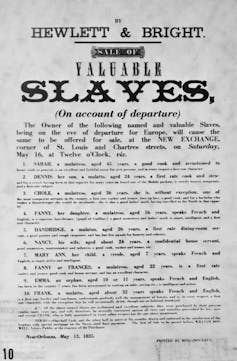American slavery wasn’t just a white man’s business − new research shows how white women profited, too
- Written by Trevon Logan, Professor of Economics, The Ohio State University

As the United States continues to confront the realities and legacy of slavery, Americans continue to challenge myths about the country’s history. One enduring myth is that slavery was a largely male endeavor — that, for the most part, the buying, selling, trading and profiting from enslavement were carried out by white men alone.
While white women certainly interacted with enslaved people in household management and day-to-day tasks, historians once argued that they weren’t active owners and had very limited involvement in transactions. This was once widely believed to be a reason why Southern white women supported the institution – they were assumed to be blind to its darker side.
As an expert in the economic history of slavery[1], I know the story is far more complex. In fact, slavery was unique in economically empowering women. It was, in essence, an early feminist institution – but exclusively for white women.
A lasting myth
The myth that women didn’t profit from slavery has endured for several reasons. First, before the American Civil War, married women generally owned nothing of their own. The legal institution of coverture[3] made the property a woman brought into her marriage into the property of her husband. This also meant that if a husband was in debt, a creditor could claim the wife’s property for payment.
In addition, there are very few surviving records that show Southern white women discussing the business of slavery. And finally, in cases where women were owners of enslaved people – say, through the death of a husband – they often used agents or male relatives to handle their affairs. Added together, there’s very little to suggest that white women were deeply involved in the slavery business.
Researchers have started to challenge this view by moving beyond the traditional archival sources[4]. The innovative historian Stephanie Jones-Rogers has documented[5] how regularly white women were seen in all aspects of American enslavement. Her most compelling evidence comes from interviews with the formerly enslaved people themselves, who noted who they were owned by and explained how belonging to the “misses” affected every aspect of their life.
The ‘white feminism’ of American slavery
Historians have also started grappling with the ways American slavery was uniquely gender-egalitarian – at least for white women. While Northern women were trapped in coverture, Southern states were bypassing coverture specifically for the purpose of giving married women rights to own enslaved people.
The earliest such act passed in the United States was the Mississippi Married Women’s Property Law of 1839[6]. This law explicitly awarded married white women ownership status over enslaved individuals. Slavery was the driver of this change: Four of the five sections of the act refer only to property in enslaved people.
Similar acts were passed by other Southern states[7] in the antebellum era to shield married women from responsibility of their husband’s debts and also to allow women to independently accumulate wealth during marriage.
Of course, laws on the books may not reflect how people actually behaved. But new research[8] shows that white women were very involved in the business of slavery. In states where enslaved people were titled property – like a house or car today – sales were recorded with names of buyers, sellers and the names of the enslaved people in the transaction. White women in states where legislation formally protected their property rights to enslaved property were much more likely to be active in the market.
Further analysis of these records shows that white women were involved in nearly a third of all transactions, buying and selling in equal proportion. White women were especially likely to buy and sell enslaved women, making up nearly 40% of the people doing the buying and selling.
Enslaved women were especially economically valuable because if someone owned an enslaved women, they automatically became the owner of all of her children. For slave owners, owning an enslaved woman was an intergenerational wealth-building activity.
A historical irony
We are left to confront a deep irony in American history. Slavery gave white women in the South significantly more economic independence than those in the North, and they used this freedom with remarkable regularity. Women in slave states had legal rights to property that was half of the wealth[10] in the southern United States at the time. Women in the North could only dream of such economic independence.
While historians once claimed that white women supported the Confederacy because they were blind to the reality of slavery, researchers now know that they could have been motivated by the same economic impulses as their husbands. Slavery was actually a more gender-egalitarian institution than other forms of property or wealth accumulation, so it’s not surprising that white women would have a vested interest in it.
Slavery was white men’s and women’s business.
References
- ^ an expert in the economic history of slavery (economics.osu.edu)
- ^ Hulton Archive/Getty Images (www.gettyimages.com)
- ^ coverture (www.womenshistory.org)
- ^ moving beyond the traditional archival sources (www.cambridge.org)
- ^ Stephanie Jones-Rogers has documented (yalebooks.yale.edu)
- ^ Mississippi Married Women’s Property Law of 1839 (users.hist.umn.edu)
- ^ Similar acts were passed by other Southern states (doi.org)
- ^ new research (doi.org)
- ^ Kean Collection/Archive Photos/Getty Images (www.gettyimages.com)
- ^ half of the wealth (doi.org)
Authors: Trevon Logan, Professor of Economics, The Ohio State University

